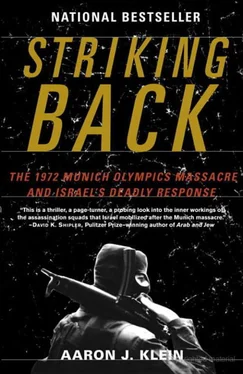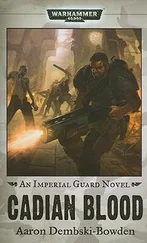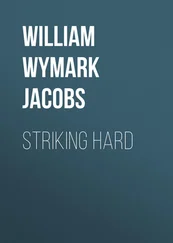Muhammad Massalha, twenty-seven, was appointed commander of the operation. He spoke fluent German. As a teen, he had lived in West Germany for several years. He chose the nickname Issa, Arabic for Jesus. His second in command, Tony (Yussef Nazzal), used the nom de guerre Che Guevara, in tribute to the South American revolutionary. Abu-Iyad referred to Tony as the military mind behind Ikrit and Biram. He was a well-educated twenty-five-year-old who spoke German well. Both men were brought into the limited circle of knowledge. In early summer, Issa and Tony visited Munich. They watched the village being built, learning its layout and its points of vulnerability. Palestinian accomplices, many of them students at German universities, helped Issa and Tony collect information. They did not ask the goal of the mission. Their mantra was blind, unflinching assistance.
With the weapons safely stored in the train station lockers, the leaders of the operation, Abu-Iyad, Abu-Daoud, and Fakhri Al-Omri, had to see to the safe arrival of the six terrorists. It was their duty to ensure that the foot soldiers, without whom the meticulously planned operation would have to be aborted, would fly out of Tripoli and arrive in Munich without arousing suspicion. There was the constant threat of discovery; one alert customs official could bring the whole mission to a halt. That did not happen.
On August 31, five days into the Olympic Games, Jamal Al-Jishey, his uncle Adnan, and Mohammed Safady landed in Munich. The three flew from Tripoli, and stopped briefly in Rome before landing in Munich. The other three foot soldiers arrived in Munich via Belgrade. They each held a Jordanian passport, forged in Beirut and delivered to Tripoli. Each passport had a fake West German entry visa. The work was so amateurish that in one of the passports the visa was attached upside down, crossed out with a black X, and replaced by an additional visa, placed right side up, on the next page. The two groups were met by Issa and Tony and taken to several small hotels and hostels located in the city center, next to the train station. During the following four days, the eight Palestinians acted like normal tourists, sightseeing, eating out, and catching up on sleep. Jamal Al-Jishey even went to two Olympic volleyball games.
On September 4, shortly before midnight, the group of eight met at the central railway station restaurant, where they learned what their mission entailed. After settling the bill, the group walked over to the nearby lockers to collect the weapons that had been waiting for them all week. They returned to their separate hotels and changed into red training suits, which would help them blend in with the athletes in the Olympic Village. They rode in two cabs. Jamal Al-Jishey, the only one to speak publicly about that night, said, “I was young, full of enthusiasm and drive, and the idea of Palestine and returning there was all that controlled my thinking and my being. We knew that achieving our objective would cost lives, but since the day we joined up, we had been aware that there was a possibility of martyrdom at any time in the name of Palestine. We were not afraid, but we felt the apprehension that a person feels when embarking on an important mission, the fear of failure.”
At 0410 hours, two groups of four operatives each reached the village’s perimeter fence, near Gate 25A. They aroused no suspicion. Like many of the athletes returning from a night on the town, they wore Olympic sweat suits and were ostensibly sneaking back to their rooms. One of the two terrorist bands met a group of American athletes near the fence. The tipsy Americans and the wired Palestinians helped each other over the simple, six-foot barrier. Once inside the village the two groups walked together for a while before parting and bidding each other good night. The terrorists carried Olympic duffel bags, their weapons hidden under clothing. They encountered no guards as they made their way through the village, although six German postal workers had noticed the Palestinians as they jumped over the fence. To their sober eyes the men seemed suspicious. They reported the break-in, but no action was taken. Walking quickly, Issa led his men straight to 31 Connollystrasse. Arriving at the building, each one pulled an AK-47 out of his gym bag, snapped a thirty-bullet magazine into place, and slipped a round into the chamber.
MUNICH, OLYMPIC VILLAGE, 31 CONNOLLYSTRASSE, APARTMENT 5
TUESDAY, SEPTEMBER 5, 1972, 0415H
Shmuel Lalkin had always been a light sleeper. At 0415 hours he awoke in his bedroom on the second floor of Apartment 5 at 31 Connollystrasse, to the jolting sound of gunfire. He went to his front-facing window and looked out. Everything appeared quiet and peaceful in the early morning light. A chilly wind beckoned him back to bed. “Maybe a nervous sharpshooter unintentionally discharged a round,” he thought to himself. The exhaustion of the past few days weighed on his eyelids. He planned to wake up in less than two hours.
A few minutes earlier, the terrorists had reached the blue door leading to Apartment 1. It was open, as always, since it led not only to the Israeli dorms but also to the parking garage and the upstairs housing units. The terrorists walked through a small foyer to the door of Apartment 1, home to seven Israeli coaches and referees. The terrorists had a copy of the key. One of them slipped it into the door; the lock wouldn’t turn. The jiggling of the key woke Yossef Gutfreund, a six-foot-three, 285-pound international wrestling referee. Gutfreund, forty, married, and the father of two young girls, had refereed at the 1968 Mexico City Olympics. Though he was a businessman by profession, the Romanian-born referee devoted much of his time to sports. He rolled out of bed and made his way toward the jarring noise.
The terrorists flipped the lock and opened the door. Gutfreund stood in the hall, barefoot, in his underwear, peering at the armed and masked men facing him. He immediately recognized the men’s intentions: Arab terrorists are coming to take us hostage. “Guys, run!” he shouted at his six sleeping roommates. Gutfreund threw the full weight of his body against the door. The terrorists, who realized they’d lost the element of surprise, pushed with all their strength. Gutfreund was an overpoweringly strong man, but the terrorists managed to wedge the steel barrel of a Kalashnikov between the door and the frame and use it as a crowbar. The former wrestler, knowing he could not hold them for long, struggled selflessly, buying time for his friends to come to their senses and escape. The only way out was through the back window.
The weight lifting trainer, Tuvia Skolsky, a Holocaust survivor who had lost his entire family on German soil, heard the sounds of Gutfreund’s desperate struggle. He bolted out of bed and into the living room, where he saw Gutfreund grappling with the half-open door. On the other side he clearly saw a man in a black ski mask prying the door open with his weapon. “I understood that I needed to escape immediately,” Skolsky, the only survivor from Apartment 1, said in his testimony. He yelled to his sleeping flatmates to run for their lives as he raced to the back window.
Everything happened quickly. Only ten seconds had passed from the moment Gutfreund blocked the door until Skolsky reached the window. The lock stuck. Skolsky knew his life was in immediate danger. Flustered and panicked, he punched through the thick double glass, cutting himself on the remaining shards as he threw himself out the window. He jumped to his feet and ran. By now the terrorists had overpowered Gutfreund. They charged into the room and began shooting at Skolsky through the broken window. “I could hear the bullets whistling past my ears,” he reported. He ran through the courtyard garden, barefoot, in his pajamas. He slipped behind the corner of the building and crouched down, stunned.
Читать дальше












